高教版中职英语(拓展模块)Uint 1《Communities》ppt课件1
中职英语基础模块unit 1PPT课件

第14页/共44页
Dialogue
(R=Ralph, J=Julie) R: Hi, Julie! I’ve heard that you are good at English. So please do me a favor, will you? J: Of course. What’s the matter? R: I am poor in English learning and I don’t know how to improve it. Could you give me some advice? J: Sure. Let’s start from pronunciation. How about your pronunciation? R: It’s too bad and is really my big headache. I can’t make myself understood by foreigners. J : That’s because your pronunciation is not correct. You can listen to some English songs and learn to sing them. It may help a lot. R: That sounds great. I’ll try. Thanks a lot. J : Don’t mention it.
Good cookies could be cooked by a good cook, if a good cook could cook good cookies. I don't know why Joan showed a yellow coat to the goat in the snow. Tom has got a lot of dots on his pocket. If he wants to wash off the dots, he will use a pot of hot water.
语文版中职英语(拓展模块)Unit 1《Social Communication》ppt课件2

7. Whenever 无论何时(引导让步 状语从句)
• Eg: You may come and get whenever you are free. 无论什么时候有空,你都可以来拿。
Sum up
• • • • • • • 1. be tolerant of宽容 2. have trouble /difficulty doing sth 做某事有困难 3. pretend to do sth 假装做某事 4. ask for 要求 5. It is +adj.+for sb to do sth. 6. leave sb doing sth 留下某人做某事Leave out 遗忘,忽略 • 7. whenever 无论何时
Unit 1 Social Communication
Warming up
• Have you ever talked with an English native speaker? • What would you do when you don’t know how to say something in English?
have no/some trouble doing sth
• Eg: The young lady has trouble solving her family’s problems. 这位年轻的女士在解决家庭问题上有困难。
We had no trouble communicating with each other. 我们在与彼此的交流上没困难。
4. ask for 要求
Eg: We ask parents for money every week.
5. It is +adj.+for sb to do sth.
中职英语基础模块上册unit1PPT课件

Kissing hands
吻手礼:吻手礼源于古代维京人用手向其日耳曼君 主递礼物的风俗,流行于欧美上层社会,是一种仅对贵 族已婚妇女实施的礼节。吻手礼一般在室内举行,并且 仅限于手腕以下部位,一般是指背。
cross one's
hands 双手合十:
这种礼仪多见于 信奉佛教的国家,比如说泰国。 泰国人见面时往往低头问候, 并将双手合十于胸前。小辈见 长辈双手举到前额高度,平辈 到鼻子高度,而长辈还礼则只 需到胸前即可。另外,泰国认 为头部是神圣的,不能随意摸 别人的头。
你呢
I'm fine,too.Tha
nk you! 我也是,谢谢
LOREM IPSUM DOLOR
Nice to meet you! 很高兴见到你 Nice to meet you,too! 也很高兴见到你
• Notes:
•
• 1. Introductions are important because a proper introduction will leave a good first impression upon others.
bisous
贴面礼: 在阿拉伯国家,两个老朋友相见 不仅仅会握手和拥抱, 还会行贴面礼。行礼时,用右手 扶着对方的左肩,左手搂住对方 的腰, 左——右——左贴面三次。如果 两人关系亲密,还会在贴面的同 时发出亲吻的声音。
rub noses
碰鼻礼:新西兰的原住民 毛利人中还保留着一种古老 的见面礼仪,即碰鼻礼。毛 利主人在初次见面时必须与 客人鼻尖对鼻尖连碰两三次, 碰的次数越多、时间越长, 则说明客人 越受他们尊敬。
New words and expressions
❖welcome
职专英语教案拓展模块Unit1
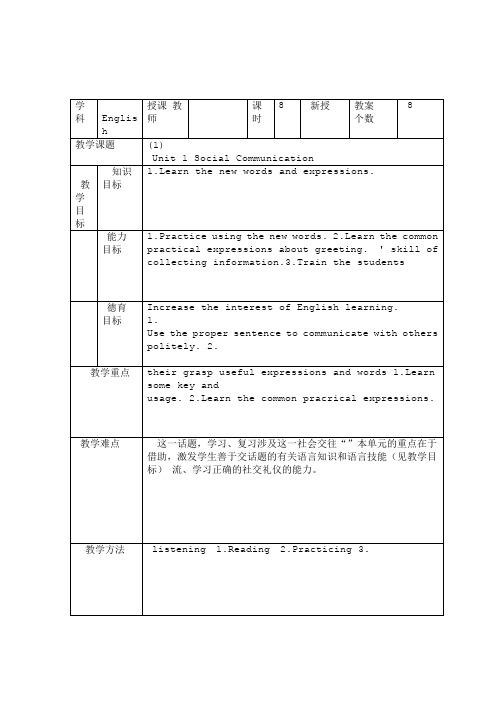
教学用具
The blackboard A tape recorder
Multi--media
教学过程
教学内容
备注
4
导入新课
讲授新课
Warming up Revision: non-native usually tolerant of 1. Why are foreignersspeaker's English?native person in your rude to talk with a 2. why is it language and leave your American friends standing there? Notes肥皂soup ask for要求某物soap肥皂迷lost rude无礼plain解释politely礼貌的conversation out忽视switch转换leave失的点头称赞nod complimentface会谈面向无论何whenever保佑bless打喷嚏sneeze概overview audience听众时cough咳嗽况
ask forswitchPretend repeat
explain
Have trouble doing
when we rang the bell, she pretended that she was
1)
not at home.
workere
tothe of the factoryexplained 2)The head
usage. 2. Learn the common practical expressions.
教学难点
这一话题,学习、复习涉及这一”本单元的重点在于借助“社会交往,激发学生善于交话题的有关语言知识和语言技能(见教学目标)流、学习正确的社交礼仪的能力。
2016中职英语拓展模块(高教版)授课教案:Unit1SocialCommunication
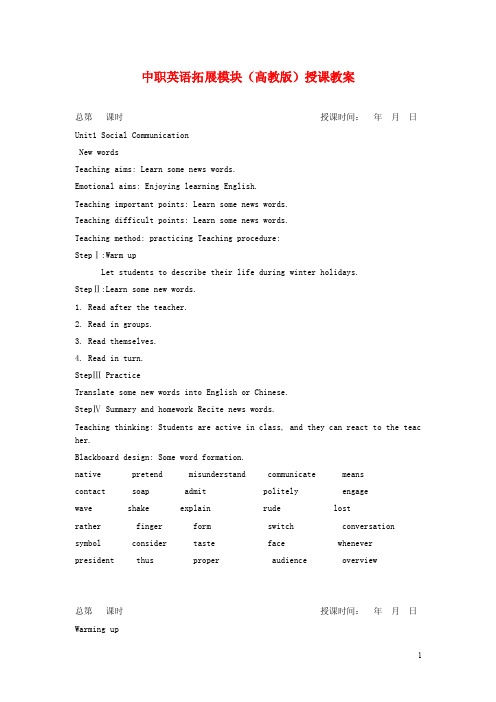
中职英语拓展模块(高教版)授课教案总第课时授课时间:年月日Unit1 Social CommunicationNew wordsTeaching aims: Learn some news words.Emotional aims: Enjoying learning English.Teaching important points: Learn some news words.Teaching difficult points: Learn some news words.Teaching method: practicing Teaching procedure:StepⅠ:Warm upLet students to describe their life during winter holidays.StepⅡ:Learn some new words.1. Read after the teacher.2. Read in groups.3. Read themselves.4. Read in turn.StepⅢ PracticeTranslate some new words into English or Chinese.StepⅣ Summary and homework Recite news words.Teaching thinking: Students are active in class, and they can react to the teac her.Blackboard design: Some word formation.native pretend misunderstand communicate meanscontact soap admit politely engagewave shake explain rude lostrather finger form switch conversation symbol consider taste face whenever president thus proper audience overview总第课时授课时间:年月日Warming upTeaching aims: Learn some news words.Emotional aims: Learn some manners in language communication.Teaching important points: Discuss some questions.Teaching difficult points: Learn some news words.Teaching method: practicing and discussing.Teaching procedure: StepⅠRevisionReview some words.StepⅡ Discussion 讨论课文插图Now look at the picture in the reading text "Etiquette in Language Communic ation".What can you see in it?-From the picture, we can see a woman is talking with a man. But the manlooks a bit uneasy, maybe he is nervous. Obviously it's not a smooth language c ommunication.StepⅢ提示相关生词和短语,如:native speaker, native language, have trouble in doing sth, pretend to do sth, repeat, explain, manner等。
高教版职高英语1基础模块Unit1课件

Li Xiaonian: Good morning, Miss Sara!
Sara:
Well, Sara is my first name. My last name is Smith, s-m-i-t-h.
Here’s my name card.
Li Xiaonian: Thank you, Miss Smith.
高教版职高英语1基础模块Unit1 课件
第1页,共64页。
第2页,共64页。
教学目标
语言知识目标: 学生能够理解并运用在不同场景下的简单问候语,能够使用be 动词的 一般现在时介绍个人及他人信息。 语言技能目标: 听 —— 学生能够听懂在不同场景下的简单问候语。
说 —— 学生能够在不同场景下用简单的问候语问候他人。 读 —— 学生能够读懂名片上的个人信息。
SLai rXai:aonian:WNeoll,, mSayralaisstmnyafmirset insaLmi.e. My last name is Smith, s-m-i-t-h.
Here’s my name card.
Sara:
I see. Where are you from?
Li Xiaonian: Thank you, Miss Smith.
第33页,共64页。
Activity 12
Talk and complete. 用下面语句询问5个以上同学的个人信息,填写表格。
What’s your name?
What’s your first name / last name? Where are you from?
My name’s … / I’m … My first name / last name is … I’m from …
中职英语拓展模块第一单元community词汇目标
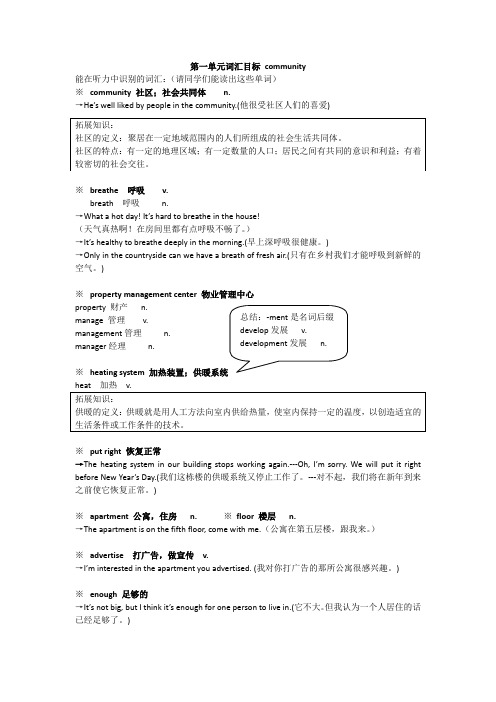
第一单元词汇目标 community能在听力中识别的词汇:(请同学们能读出这些单词)※ community 社区;社会共同体 n.→He ’s well liked by people in the community.(他很受社区人们的喜爱)※ breathe 呼吸 v.breath 呼吸 n.→What a hot day! It ’s hard to breathe in the house!(天气真热啊!在房间里都有点呼吸不畅了。
)→It ’s healthy to breathe deeply in the morning.(早上深呼吸很健康。
)→Only in the countryside can we have a breath of fresh air.(只有在乡村我们才能呼吸到新鲜的空气。
)※ property management center 物业管理中心property 财产 n. manage 管理 v. management 管理 n. manager 经理 n.※ heating system 加热装置;供暖系统※ put right 恢复正常→The heating system in our building stops working again.---Oh, I ’m sorry. We will put it right before New Year ’s Day.(我们这栋楼的供暖系统又停止工作了。
---对不起,我们将在新年到来之前使它恢复正常。
)※ apartment 公寓,住房 n. ※ floor 楼层 n.→The apartment is on the fifth floor, come with me.(公寓在第五层楼,跟我来。
)※ advertise 打广告,做宣传 v.→I ’m interested in the apartment you advertised. (我对你打广告的那所公寓很感兴趣。
语文版中职英语(拓展模块)Unit 1《Social Communication》ppt课件1

should be honest and friendly.
• 1.Americans are usually tolerant of nonnative speakers ( who have some trouble understanding English .)
• 6.Now that you've studied this quick overview of manners in the US, you're ready to be polite in English.
• 既然你已经对美国礼仪有了简要的了解,你就完 全可以有礼节地使用英语了。
• now that...“既然„„”,引导让步状语从句,例如:
• You'd better leave the windows open.你最 好让窗户开着。
• His illness left him with a weak heart.他的 病导致他心脏虚弱。
• 4.If you must switch to your native language to explain something to a nonEnglish speaker, at leas‘tell your American friends so that they don,t feel left out.
• Now that you have come,you may stay here for some days.
• 既然你来了,就在这儿呆几天吧。
• Now that you are alone,you can speak freely. 既然是你一个人,你就可以随便说 了。
《social munication》中职英语(拓展模块)unit 1ppt课件1【语文版】

How are you?
New words and expressions
1.human 2.native 3.tolerant 4.annoy
15.face pliment 17.cough 18.bless
5.pretend
6.misunderstand 7.ask for 8.admit 9.politely 10.explain 11.rude 12.lost 13.switch 14.leave out
• switch可与on,off用,表示“开、关(电器等设 备)”,例如:
• Please switch the TV on.请打开电视。
• explain sth. to sb.意思是“向某人解释„„”。例 如:
• Please explain this rule to her单纯是指听老师说的话,把握老师的表情和语调之类的小细节也是很有必要的。说话比平时更用力,或者表情严肃地强调的那个部分几乎百分之百地会出现在考试中。但是如果坐在后面,那种重要的提示就全都错过了。
•
与此相反,如果坐在前面,首先心情就很不同,自己比别人靠前的感觉让你听课时的态度变得更积极。与老师眼神交会的机会增多,感觉就好像是老师在做一对一个人辅导。
• 4.If you must switch to your native language to explain something to a non-English speaker, at leas‘tell your American friends so that they don,t feel left out.
• 6.Now that you've studied this quick overview of manners in the US, you're ready to be polite in English.
高教社中职英语基础模块1unit课件

情境活动:设计各种情境活 动,让学生在活动中学习和
运用知识
情境评价:通过情境评价, 了解学生的学习情况和效果
任务驱动
任务驱动教学法: 以任务为驱动, 引导学生主动学 习
任务设计:设计 具有挑战性和趣 味性的任务,激 发学生的学习兴 趣
任务实施:引导 学生完成任务, 提高学生的实践 能力和创新能力
任务评价:对学 生完成任务的过 程和结果进行评 价,促进学生自 我反思和自我提 升
感谢您的观看
汇报人:
教师评价与反馈
评价标准:根据学生的学习表现、 作业完成情况、课堂参与度等方面 进行评价
反馈方式:及时向学生反馈评价结 果,指出优点和不足,提出改进建 议
添加标题
添加标题
添加标题
添加标题
评价方式:采用多种评价方式,如 教师评价、学生自评、同伴互评等
反馈内容:包括学习态度、学习方 法、学习效果等方面的反馈,帮助 学生了解自己的学习情况,提高学 习效果。
教学演示:教师示范讲解,帮助学 生掌握技能
添加标题
添加标题
添加标题
添加标题
教学动画:生动有趣的动画,帮助 学生理解知识点
教学案例:真实案例,帮助学生理 解知识点在实际中的应用
拓展资源
教材配套网站:提 供在线学习资源和 教学辅助工具
网络课程:提供在 线课程和视频教程, 方便学生自主学习
教学软件:提供英 语学习软件,如单 词记忆、听力训练 等
适用人群
中等职业学校学生
英语基础薄弱的学生
希望提高英语水平的学生
英语教师和教学研究人员
课件特点
内容丰富:涵盖中 职英语基础模块1 的所有知识点
形式多样:包括视 频、音频、图片、 文字等多种形式
高教版中职英语(拓展模块)Uint 1《Communities》ppt课件1
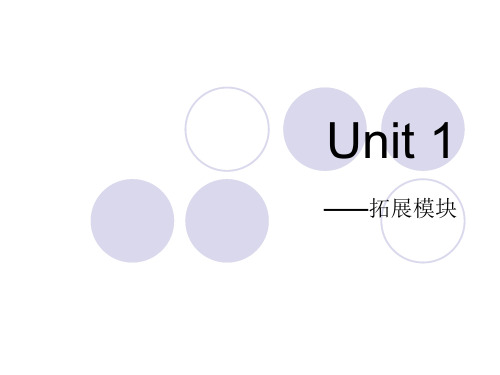
of/towards others . 她因自己有错,对别人的错就概不计较了。
have some/no trouble (in) doing sth
have some/no trouble (in) doing sth. 在.……方面(没)有麻烦
这颜色好像是绿色而不是蓝色。 The colour seems green rather than blue .
我想喝冷饮不想喝咖啡。 I think I will have a cold drink rather than
coffee .
So that “以便于” 表目的
I hired a boat so that I could go fishing . 我租了一条船,目的是可以去钓鱼。 So…that… “如此……以至于…… ” 表结果 Such…that…
Unit 1
——拓展模块
Americans are usually tolerant of nonnative speakers ( who have some trouble understanding English .)
美国人对(理解英语有困难的)非本国人 一般比较宽容/谅解。
But they become annoyed [when a person pretends to understand but doesn’t really and then creates problems because of misunderstanding what was said .]
但是 当一个人不懂装懂,并且由于误解所 听的话而造成问题时owards… “对…宽容”
高教版中职英语基础模块一 Unit1 文化理解和小组活动精美课件

Underline important information about Lu Xun’s three different names in this information board.
在以下简介牌中标出有关鲁迅先生三个不同名字的重要信息。
Lu Xun (鲁迅) was born in September, 1881. His grandfather named him Zhou Zhangshou (周樟寿), which means longevity (长寿). In April, 1898, he became a student in Jiangnan Naval Academy (江南水师学堂). His grandfather’s brother, Zhou Jiaosheng (周椒生), named him Zhou Shuren (周树人). The given name means educating the young. In May, 1918, he published A Madman’s Diary (《狂人日记》) under the now famous pen name Lu Xun. It is said that he chose Lu Xun because Lu is his mother’s family name and Xun means being fast.
Review
live with sb/sth
和某人或某物住在一起
love sb/sth very much 非常爱某人/某物
live in + 地点
居住在某地
be strict with sb
对某人严格
cook /make lunch
职高英语基础模块上Unit1课件
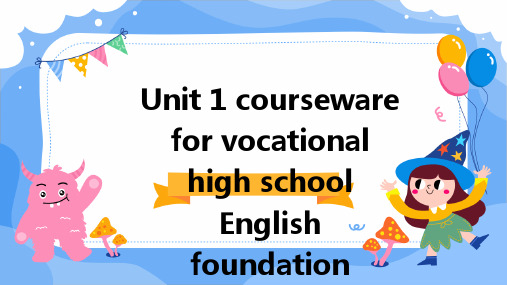
Listening exercises and answer analysis
Exercises should be designed to test students' comprehension of the listening materials rather than their ability to repeat words or phrases.
Students should be taught how to understand different speaking rates and volumes, as well as the use of pauses, emphasis, and intonation.
Students should be taught how to identify different types of English language registers, such as formal and informal language.
• Giving advice and suggestions: This topic helps students learn to give advice and suggestions on various topics, such as healthy living, travel, and study skills. They also learn to use modal verbs, such as "should" and "could," appropriately.
Analysis of Reading Skills
识别并分析文章结构
引导学生识别文章的主题句、段落大 意和整体结构,帮助学生理解文章的 主旨和逻辑关系。
中职教材英语(拓展模块)教学课件U1

4) What is the passage mainly about? A. How to prepare for your success. B. How to face challenges in your life. C. How to build a positive self-image. D. How to develop your good qualities.
and make it a priority to change. If you feel blue for not being great at maths,
A.Accepting yourself
find a tutor. If you feel weak because you cannot finish a 1,500-metre run, get
Listening and Speaking
1. Learn these words and expression.
handle complain
pressure
relax cheer up
stupid
probably review
2. Listen to the dialogue and choose the best answers.
2. talk about school life. 3. write an invitation letter.
6 Comprehensive Exercises
Look at the picture and discuss:
1. How do you enjoy your school life? 2. Which is more important, to be popular or to study well?
中职英语拓展模块Unit课件

English Song Competition
04
Current evaluation
Content accuracy
Check the accuracy and reliability of the course content to ensure it is in line with academic standards and professional knowledge
+Critical Essay Writing: Students are introduced to the elements of a critical essay, including thesis development, evidence collection, and argumentation
+Business Correspondence: Students learn how to write emails, letters, and memories in a formal and professional manual
English writing
03
Practical activity
+Critical Thinking: Students are resourced to analyze the content and evaluate the credibility of the information they have read
01
02
03
04
05
English reading
Summary
Improving oral skills
Detailed description
Unit 1课件-2021-2022学年中职英语(第三册)(山东省职业教育出版)拓展模块

Unit 1
We are willing to adjust our schedule for the event. 我们愿意为这个活动调整我们的计 划。
She carefully adjusted her clothes and her hair before going out. 她出门之前仔细地整了整衣服和头 发。
Unit 1
Listening Speaking
□ Listen to English 10 minutes before going to bed. □ Listen to English 10 minutes after getting up. □ Listen to English 10 minutes after school.
4) — Do you often adjust your schedule? — Sometimes. / Often. / Never.
Unit 1
All of us around the world, no matter what time zone we live in, have 24 hours in each day. A daily schedule will help us plan every part of our day, from the moment we wake up in the morning to the moment we go to bed at night. We should be able to take control of how we spend our time from one hour to the next.
Unit 1
I will believe that when I see it. 我亲眼见到才能相信。 Believe me, smoking is harmful. 相信我,吸烟有害。
语文版中职英语(拓展模块)Unit 1《Social Communication》ppt课件2

3. pretend to do sth 假装做某事
Eg: I pretended to not see her in the park. 我假装在公园没看见她。 Eg: The boy pretended to be reading book ,when the teacher came to see him . 老师进来时,男孩假装正在读书。
the last sentence
the first sentence the first sentence the first sentence
Careful reading
• Read the text again and list the etiquettes in the passage.
6. Leave sb doing sth 留下某人做某事
Eg:The mother left her little son standing in the sun.
妈妈让孩子晒在太阳底下。
Leave out 遗忘,忽略
Eg: He left out a letter so he made a big mistake in the sentence.
have no/some trouble doing sth
• Eg: The young lady has trouble solving her family’s problems. 这位年轻的女士在解决家庭问题上有困难。
We had no trouble communicating with each other. 我们在与彼此的交流上没困难。
Unit 1 Social Communication
Warming up
• Have you ever talked with an English native speaker? • What would you do when you don’t know how to say something in English?
职专英语教案拓展模块Unit1精编版
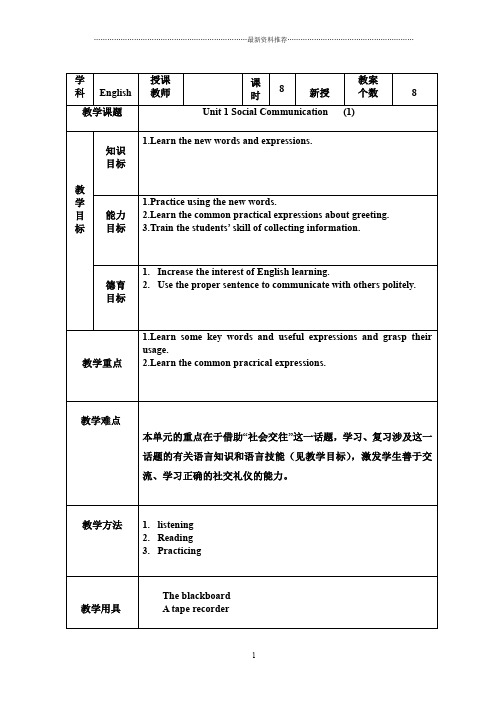
soap肥皂ask for要求某物soup肥皂politely礼貌的plain解释rude无礼lost迷失的switch转换leave out忽视conversation会谈face面向compliment称赞nod点头sneeze打喷嚏bless保佑whenever无论何时cough咳嗽audience听众overview概况
3.Words and expressions
mon Practical Expressions
学科
授课教师
课型
教学课题
Grammar:让步状语从句和目的状语从句
教
学
目
标
知
识
目
标
学习语法让步状语从句和目的状语从句
能
力目Biblioteka 标通过学语法提高做句子和理解句子的能力
教
学
重
点
状语从句
教
学
难
点
让步状语从句
1.Read the new words.
plete the following sentences with the correct forms of the words or phrases in the box.
Pretend repeat switch ask for
Have trouble doing explain
A. as long as B. as soon as
C. now that D. so that
2. David didn’t’t give up ______ he had failed in the experiment four times. (2011江苏南通)
A. if B. while
- 1、下载文档前请自行甄别文档内容的完整性,平台不提供额外的编辑、内容补充、找答案等附加服务。
- 2、"仅部分预览"的文档,不可在线预览部分如存在完整性等问题,可反馈申请退款(可完整预览的文档不适用该条件!)。
- 3、如文档侵犯您的权益,请联系客服反馈,我们会尽快为您处理(人工客服工作时间:9:00-18:30)。
• 答应做……
• 为……而付费,付……的费用
• 与某人争吵
• It seems/seemed that…“似乎……看来……”
• eg:It seems that we can with the game today . 看来今天 我们能赢得这场比赛。
• sb. seems to be/do “……似乎……”
•
有的学生恰恰就是因为这一点,讨厌坐在前面。和老师眼神交会非常有负担,稍微做点儿小动作就会被老师发现,非常不方便。而且坐在前面说不定还会被问到一些难以回答的问题。
•
但是,那却是提升成绩最快的方法。学习要带有一定程度的紧张感,坐在前面,自然而然就会紧张起来。没有必要自己费心思集中精神,那种环境就能帮助你做到。虽然看上去好像不太方便,但其实那才是最便于学习的位置。
• 既然你来了, 就在这呆几天吧。
•
you are alone , you can speak freely . 既然是你一个
人,你就可以随便说了。
• by all means • by any means • by no means
• 当然 • 不顾一切,用任何办法 • 决不
be engaged in doing sth.
忙于, 从事(某事)参与(某事)
• Eg:这位女士为孩子们做衣服。 • The lady is engaged in making clothes for children. • 这人一生从事教学工作。 • The man is engaged in teaching all his life .
for instance= for example “例如” take…for example “以……为例”
2019/10/19
教学资料精选
21
谢谢欣赏!
2019/10/19
教学资料精选
22
是老师在上课时补充讲解的,如果不听讲很可能就会错过这些重点。
•
所以,上课的时间一定要专注于课堂,决不能打开别的习题集去学习,这样才是高效率的学习,才是提高成绩最快的方法。因此,困难也要先听课,那对你将来的自学一定会很有帮助,哪怕你只是记住了一些经常出现的术语,上课的内容好像马上就忘光
了,但等到你日后自己学习的时候,也能让你回想起很多内容。
• 我想喝冷饮不想喝咖啡。 • I think I will have a cold drink rather than coffee .
So that “以便于” 表目的
I hired a boat so that I could go fishing .
•我S租o…了t一ha条t…船,目• “的如是此可…以…去以钓至鱼于。…… ” 表结果 • Such…that…
•
低着头,心情就放松了,但那种放松对学习一点好处也没有,之所以会放松,就是因为觉得即便是自己开小差,老师也不知道。如果你往前看,不时地和老师眼神交会一下,注意力必然会集中起来。和老师眼神交汇的那种紧张感会让你注意力集中,并充
实地听完整堂课。
•
3、课前预习
•
课前预习新课内ቤተ መጻሕፍቲ ባይዱ,找出不理解的地方标记下来。预习后尝试做课后练习题,不要怕出错,因为老师还没有讲,出错也是正常的。
• 以我姐姐为例,她时一位很优秀的歌手。 • Take my sisiter for example,she is an excellent singer .
Rather than…介词 “而不是”
• 这颜色好像是绿色而不是蓝色。 • The colour seems green rather than blue .
•
关键是,出错了你就知道上课时应该重点听哪里,注意力自然就能集中了。
•
4、即便上课时不理解也不要放弃
•
有些同学觉得老师讲的听不懂,就干脆不再听讲,按照自己的方法去学习。其实这样做真的很傻,因为不听讲就非常容易和同学们的学习进度脱节,这就会直接导致考试时成绩下降。原因是,老师讲的内容不一定都在教材中体现,有相当一部分重点内容
• Unit 2 • 生活就是选择。 • 又恨又爱 • 情绪很好/不好 • 有做某事的兴致 • eg: She • He’s always • He is not
today . 她今天心情很好。
on Mondays . 他每星期一情绪都很坏。
for
. = He is not
to
.
• 正面的事,让人振奋的事 • 重要的事 • 新鲜的事 • 每当……时候 • 或者……或者……
•
2、不要看书,要看老师的眼睛
•
只要老师不是在一味地读教材,那老师的“话”就不可能和你低头看着的教材上的“文字”一致。头脑聪明的学生,也许能做到既集中精神听老师的话,又集中精神看眼前书上的内容。可是实际上大部分的学生都做不到这一点。
•
认真听讲的第一个阶段就是上课时间无条件地“往前看”,上课的时候看书往往很容易开小差。摒除杂念,将视线从摊在眼前的书上移开。老师讲课的时候只看前面,集中注意力听老师嘴里说出来的话,那才是认真听讲的态度。
Would you mind my switching the radio off ? 我 关掉收音机, 你介意吗?
Would you mind switching the radio off ? 你介意 去关掉收音机,吗?
Now that 既然
• Now that you have come, you may stay here for some days .
难读到老师的表情。认真听讲不单纯是指听老师说的话,把握老师的表情和语调之类的小细节也是很有必要的。说话比平时更用力,或者表情严肃地强调的那个部分几乎百分之百地会出现在考试中。但是如果坐在后面,那种重要的提示就全都错过了。
•
与此相反,如果坐在前面,首先心情就很不同,自己比别人靠前的感觉让你听课时的态度变得更积极。与老师眼神交会的机会增多,感觉就好像是老师在做一对一个人辅导。
• insisit that (should )+V.原形
• eg:I insited on staying here .
• The teacher insisited that the school should pay more attention to the students’learning in school.
• have some/no trouble (in) doing sth. 在.……方面(没)有 麻烦
• 在……方面有(无)困难 • have some/no difficulty (in) doing sth.
be annoyed with sb. “生……的气” be annoyed at sth. “讨厌某事/物”
• They seemed to have finishied the work two hours before . 他们好像两个小时前就完成了
编者语
• 要如何做到上课认真听讲?
•
我们都知道一个人的注意力集中时间是有限的,一节课45分钟如何保持时时刻刻都能认真听讲不走神呢?
•
1、往前坐
•
坐的位置越靠后,注意力就越难集中。老师不会注意到你的事实可以让你不再紧张,放心去做别的事情。坐在后面,视线分散,哪怕你是在看老师,如果有人移动,你的视线就会飘到那个同学的后脑勺上去,也就无法集中注意力。 而且,坐在后面很
• 归根到底,基本论点 • 陷入……困境,牵扯进去 • 在……方面取得成功 • 由于……多亏……
• 选择你所爱的,爱你所选择的。 • 为什么不选择我们喜爱的,并且快乐地生活呢! • 用完了,失去 • 要求 讨价 • 朝四周看 环视 • “照亮… (人的脸)荣光焕发”
• insist on/upon +sth/doing sth 坚持某事 坚持做某事
• 他佯装不知实情。 • He pretended not to know the fact . • 他假装病了以便能待在家里。 • He pretended( that he was ill )so that he could stay at
home .
switch
eg:I don’t like this TV play , let’s another program .
• 但是 当一个人不懂装懂,并且由于误解所听的话而造成问题时, 他们会烦恼的。
be tolerant of/towards… “对…宽容”
Eg: Mr. Smith
isn’t tolerant of your mistake .
史密斯先生不会原谅你的b错e 误to。lerant of
• We should always
Unit 1
——拓展模块
• Americans are usually tolerant of nonnative speakers ( who have some trouble understanding English .)
• 美国人对(理解英语有困难的)非本国人一般比 较宽容/谅解。
• But they become annoyed [when a person pretends to understand but doesn’t really and then creates problems because of misunderstanding what was said .]
the views if we
disagree with them .
即使我们不同意别人的观点,我们也应该对此宽宏大量。
• Her own mistakes made her very tolerant of/towards others .
她因自己有错,对别人的错就概不计较了。
